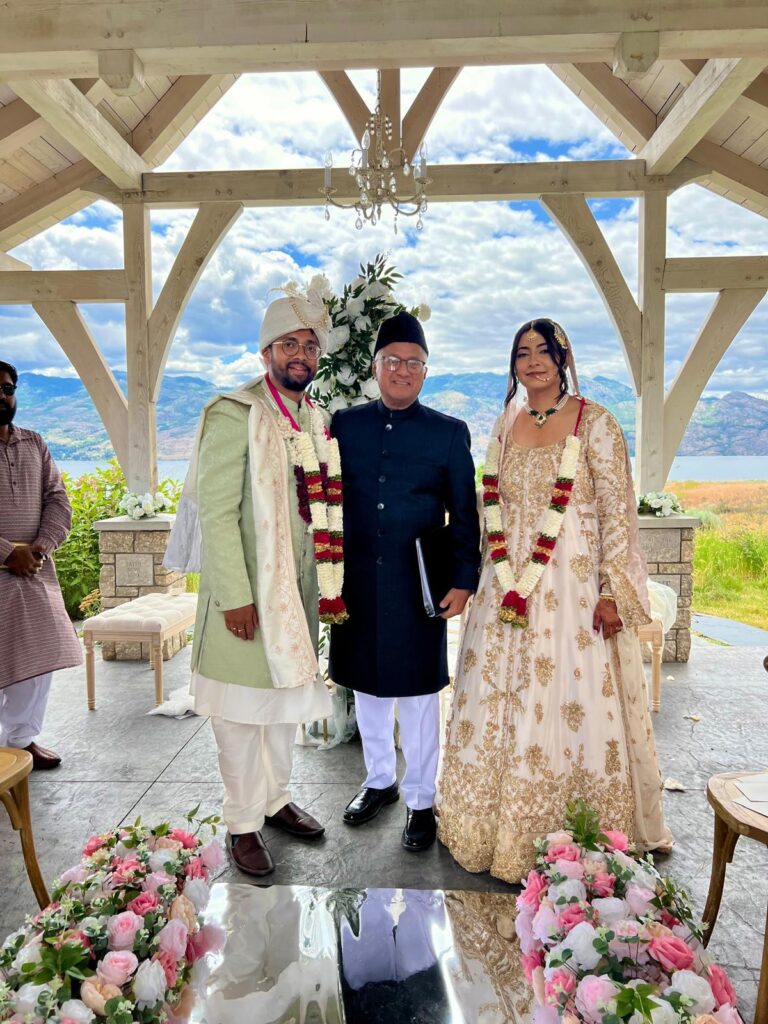
Introduction to Nikah
In Islam, Nikah refers to the Islamic religious marriage agreement or ceremony that formalizes the union between a man and a woman as husband and wife. The term “Nikah” is an Arabic word meaning marriage or matrimony. It is both a sacred and legal agreement in Islam, establishing the rights and responsibilities of both spouses according to Islamic teachings. However, in the United States, Canada and other democracies, it is merely a religious agreement and not a legal document.
The Quran clearly defines who among relatives can marry whom—some are permitted while others are not. Outside of these familial boundaries, Muslims are open to marry anyone permissible under Islamic law.
God created the universe in harmony and granted us free will, which has the potential to foster peace and unity among individuals, families, communities, and nations, but it can also lead to conflicts and wars. God desires for His creation to live in harmony, as mentioned in the Quran (55:1-13). To restore this harmony, He sends prophets, peacemakers, ensuring that every person can feel secure in their identity. All that God expects from us is gratitude and a commitment to promoting peace and harmony among His creation. He is the Rabbul Aalameen, the Creator, Sustainer, and Recycler of the universe. It is He who brings individuals together, unites them in marriage, and empowers them to live in harmony, as outlined in the Quran (30:21).
وَمِنْ آيَاتِهِ أَنْ خَلَقَ لَكُم مِّنْ أَنفُسِكُمْ أَزْوَاجًا لِّتَسْكُنُوا إِلَيْهَا وَجَعَلَ بَيْنَكُم مَّوَدَّةً وَرَحْمَةً إِنَّ فِي ذَٰلِكَ لَآيَاتٍ لِّقَوْمٍ يَتَفَكَّرُونَ
Mohmmad Asad, “And among His wonders is this: He creates for you mates out of your own kind. so that you might incline towards them, and He engenders love and tenderness between you: in this, behold, there are messages indeed for people who think.”
Safi Kaskas, “And among His signs is that He created spouses for you from among yourselves, so that you may find peace with them, and He has placed affection and mercy between you. In this, there are signs for people who think.”
Bijan Moeinian, “And among His signs is that He created spouses for you from among yourselves, so that you may find peace with them, and He has placed affection and mercy between you. In this, there are signs for people who think.”
Mike Ghouse, Reflecting on Bijan’s statement, “spouses from your own species so that you may find tranquility,” I consider the natural order of the animal kingdom: monkeys do not mate with dogs, dogs do not mate with tigers, and tigers do not mate with goats. Each species has its own suitable partner, just as humans are meant to find comfort among their own kind.
With 8 billion people on Earth, God guides two hearts to come together like a divine GPS. Most find peace and harmony in their relationships. This principle of nature remains universal—love, harmony, and tranquility are fundamental aspects of creation’s design, and marriage is a natural extension of it.
Key Elements of Nikah
1. Mutual Consent
Both the bride and groom must willingly agree to the marriage without any coercion. Free will is emphasized here. In the marriages I officiate, my first question is always: “Today, are you marrying out of your own free will and choice, right Amina? Right, Donovan?”
2. Mahr (Dowry or Common-Sense Gift)
This is an essential aspect of Nikah, originally established as a security measure for women. Historically, women seldom worked outside the home after marriage but they worked at home raising children and taking care of families. If a man went off to war and did not return, the woman would be left to raise children alone.
To prevent hardship, society developed a system in which the husband sets aside funds—Mahr—to be used by the wife if necessary. This ensures her protection, financial security, and dignity until she can support herself.
Today, in the United States, Canada, UK and other democracies where I officiate the weddings, where women and men work and are independent, exchange of rings, or token cash in an envelope or Jewelry will serve the purpose.
3. Witnesses
The Nikah must be witnessed by at least two individuals of good character. Witnesses validate the marriage and safeguard both spouses’ rights.
4. Proposal and Acceptance (Ijab and Qubul)
The contract includes a formal offer (ijab)—typically from the bride’s side—and an acceptance (qubul= I do, I accept) by the groom, in the presence of the Wali and witnesses. An important example is the marriage of Prophet Muhammad (peace be upon him) to Khadija, who proposed to him. This marked one of the first instances of a woman initiating a marriage in Islamic history.
5. Public Announcement
The marriage should be announced publicly to ensure transparency and community acknowledgment. This is primarily for the protection and respect of women.
6. Religious Obligations
Nikah is often solemnized by an Islamic scholar or officiant, who recites traditional Quranic verses and delivers a khutbah (sermon). This emphasizes the spiritual and moral responsibilities of marriage.
Purpose and Significance of Nikah
- Nikah is considered a sacred bond and a form of worship (ibadah) in Islam, fulfilling the human need for companionship and family life within the boundaries of Sharia.
- It establishes a lawful relationship, promoting chastity and creating a framework for mutual love, respect, and support between spouses.
- The Prophet Muhammad (peace be upon him) emphasized that marriage completes half of one’s faith, guiding couples toward a righteous path. Islam is about living righteously.
- Once married, spouses often become more mindful of their behavior, avoiding wrongdoing and strengthening their faith.
Conditions for a Valid Nikah
- Both parties must be eligible to marry (not within prohibited relationships such as close relatives). The Quran explicitly lists whom one can and cannot marry and it is based on common sense and genetics.
- The bride must have the consent of her guardian (wali), typically her father or a close male relative. However, in different contexts—such as in the United States—mothers or sisters may serve as guardians.
- The contract must comply with Islamic principles, avoiding any terms that contradict Sharia. At its core, Sharia simply means a relationship based on righteous and fairness.
- The Nikah must meet the following requirements; Freewill, family blessings, Mahr, Ijab o Qabool (Acceptance). Signatures of bride, groom, guardian/wakil, witnesses and officiant. Followed by Qutba (Sermon), Dwas, public announcement and Walima (dinner).
- In the United States and Canada, the Nikah document is a religious agreement and not a legal document.
- The officiant can sign the legal certification by the county or the city.
Conclusion
In summary, Nikah is both a legally and spiritually binding contract in Islam. It formalizes marriage while ensuring mutual rights, responsibilities, and commitments between spouses. Above all, Nikah fosters a relationship rooted in faith, respect, and love.
If it is not common sense, then it is not Islam ©.
Dr. Mike Mohamed Ghouse
Nikah Officiant
www.InterfaithMarriages.org
www.MuslimWeddingOfficiant.org
More to read:
What is Progressive Islam – https://worldmuslimcongress.org/progressive-islam-reviving-the-prophets-vision-in-todays-world/
Sunni Muslim, is that who I am? https://worldmuslimcongress.org/sunni-muslim-is-that-who-i-am-2/
Muslim background of Mike Ghouse – https://interfaithmarriages.org/muslim-background-of-dr-mike-mohamed-ghouse/
Dr. Mike Ghouse is the President and founder of the Center for Pluralism and director of the World Muslim Congress. He is an Interfaith Wedding Officiant for InterfaithMarriages.org and a Muslim Wedding Officiant. He is a Muslim, Pluralist, activist, thinker, speaker, author, and social scientist. More https://interfaithmarriages.org/muslim-background-of-dr-mike-mohamed-ghouse/



